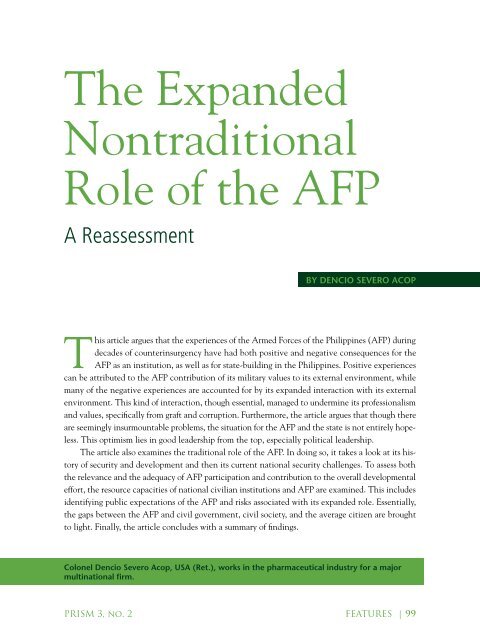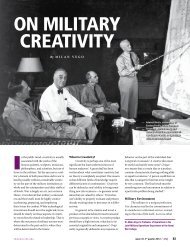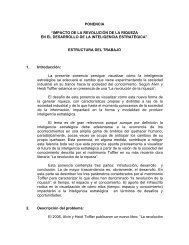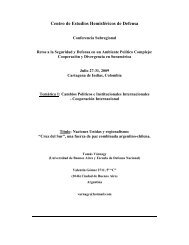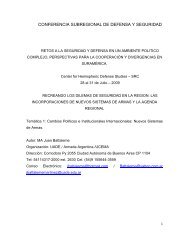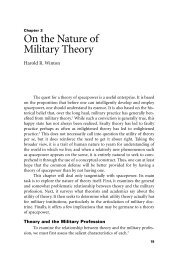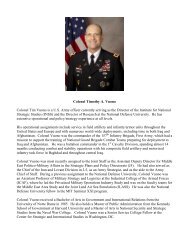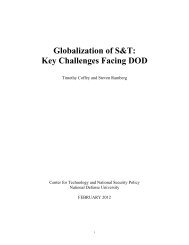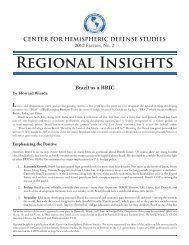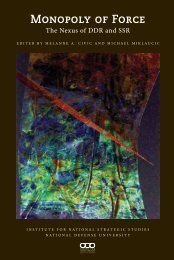The Expanded Nontraditional Role of the AFP - National Defense ...
The Expanded Nontraditional Role of the AFP - National Defense ...
The Expanded Nontraditional Role of the AFP - National Defense ...
You also want an ePaper? Increase the reach of your titles
YUMPU automatically turns print PDFs into web optimized ePapers that Google loves.
<strong>The</strong> <strong>Expanded</strong><br />
<strong>Nontraditional</strong><br />
<strong>Role</strong> <strong>of</strong> <strong>the</strong> <strong>AFP</strong><br />
A Reassessment<br />
By DenCIo SeVeRo aCoP<br />
This article argues that <strong>the</strong> experiences <strong>of</strong> <strong>the</strong> Armed Forces <strong>of</strong> <strong>the</strong> Philippines (<strong>AFP</strong>) during<br />
decades <strong>of</strong> counterinsurgency have had both positive and negative consequences for <strong>the</strong><br />
<strong>AFP</strong> as an institution, as well as for state-building in <strong>the</strong> Philippines. Positive experiences<br />
can be attributed to <strong>the</strong> <strong>AFP</strong> contribution <strong>of</strong> its military values to its external environment, while<br />
many <strong>of</strong> <strong>the</strong> negative experiences are accounted for by its expanded interaction with its external<br />
environment. This kind <strong>of</strong> interaction, though essential, managed to undermine its pr<strong>of</strong>essionalism<br />
and values, specifically from graft and corruption. Fur<strong>the</strong>rmore, <strong>the</strong> article argues that though <strong>the</strong>re<br />
are seemingly insurmountable problems, <strong>the</strong> situation for <strong>the</strong> <strong>AFP</strong> and <strong>the</strong> state is not entirely hopeless.<br />
This optimism lies in good leadership from <strong>the</strong> top, especially political leadership.<br />
<strong>The</strong> article also examines <strong>the</strong> traditional role <strong>of</strong> <strong>the</strong> <strong>AFP</strong>. In doing so, it takes a look at its history<br />
<strong>of</strong> security and development and <strong>the</strong>n its current national security challenges. To assess both<br />
<strong>the</strong> relevance and <strong>the</strong> adequacy <strong>of</strong> <strong>AFP</strong> participation and contribution to <strong>the</strong> overall developmental<br />
effort, <strong>the</strong> resource capacities <strong>of</strong> national civilian institutions and <strong>AFP</strong> are examined. This includes<br />
identifying public expectations <strong>of</strong> <strong>the</strong> <strong>AFP</strong> and risks associated with its expanded role. Essentially,<br />
<strong>the</strong> gaps between <strong>the</strong> <strong>AFP</strong> and civil government, civil society, and <strong>the</strong> average citizen are brought<br />
to light. Finally, <strong>the</strong> article concludes with a summary <strong>of</strong> findings.<br />
Colonel Dencio Severo acop, uSa (Ret.), works in <strong>the</strong> pharmaceutical industry for a major<br />
multinational firm.<br />
PRISM 3, no. 2 FeatuReS | 99
acoP<br />
Traditional <strong>Role</strong> <strong>of</strong> <strong>the</strong> <strong>AFP</strong><br />
<strong>The</strong> <strong>National</strong> <strong>Defense</strong> Act <strong>of</strong> <strong>the</strong><br />
Philippines specifies <strong>the</strong> traditional role <strong>of</strong><br />
<strong>the</strong> <strong>AFP</strong> as defender <strong>of</strong> <strong>the</strong> state and protector<br />
<strong>of</strong> national sovereignty and territorial<br />
integrity. This role is consistent with <strong>the</strong> universal<br />
role given to <strong>the</strong> armed forces <strong>of</strong> any<br />
country. Though formalized soon after <strong>the</strong><br />
Philippines gained its independence from <strong>the</strong><br />
United States in 1946, <strong>the</strong> <strong>AFP</strong>’s less formal<br />
beginnings already saw defensive actions during<br />
<strong>the</strong> revolutionary war against its former<br />
colonial master Spain in 1896–1898, against<br />
<strong>the</strong> United States in 1899–1901, and against<br />
<strong>the</strong> left hand <strong>of</strong>fered developmental<br />
projects while <strong>the</strong> right hand firmly<br />
dealt with <strong>the</strong> rebels who challenged <strong>the</strong><br />
authority <strong>of</strong> <strong>the</strong> government<br />
Japan during World War II. Following independence,<br />
<strong>the</strong> <strong>AFP</strong> defended <strong>the</strong> state against<br />
Filipino rebels who wanted to overthrow <strong>the</strong><br />
government. Some degree <strong>of</strong> revolt has persisted<br />
to this day. <strong>The</strong> <strong>AFP</strong> decisively defeated<br />
<strong>the</strong> Partido Komunista ng Pilipinas (PKP) and<br />
its military arm, <strong>the</strong> Huk army, in 1954 following<br />
an insurgency war that began in 1951. <strong>The</strong><br />
<strong>AFP</strong> continues to fight <strong>the</strong> Communist Party<br />
<strong>of</strong> <strong>the</strong> Philippines (CPP) and its military arm,<br />
<strong>the</strong> New People’s Army, which has rebelled<br />
against established authority since 1968.<br />
<strong>The</strong> <strong>AFP</strong> fought against <strong>the</strong> Moro <strong>National</strong><br />
Liberation Front (MNLF) in Mindanao from<br />
<strong>the</strong> early 1970s until 1996 when a peace treaty<br />
was signed. That notwithstanding, a breakaway<br />
faction called <strong>the</strong> Moro Islamic Liberation<br />
Front (MILF) has managed to wage war since<br />
1975. In fact, although <strong>the</strong> MILF has taken<br />
part in peace talks with <strong>the</strong> government,<br />
ano<strong>the</strong>r breakaway group, <strong>the</strong> Bangsamoro<br />
Islamic Freedom Movement/Bangsamoro<br />
Islamic Armed Forces, continues to wage war.<br />
<strong>The</strong>n, <strong>of</strong> course, <strong>the</strong>re is <strong>the</strong> extremist Abu<br />
Sayyaf Group (ASG), which continues to<br />
operate in <strong>the</strong> Autonomous Region <strong>of</strong> Muslim<br />
Mindanao and occasionally inflicts casualties<br />
on <strong>the</strong> <strong>AFP</strong>.<br />
<strong>The</strong> <strong>AFP</strong> is nei<strong>the</strong>r as large nor technologically<br />
modern as most <strong>of</strong> its regional<br />
counterparts. In fact, it is arguably among <strong>the</strong><br />
weakest militaries in <strong>the</strong> area. <strong>The</strong> army is <strong>the</strong><br />
largest among <strong>the</strong> three branches <strong>of</strong> service,<br />
comprising some 10 infantry divisions with<br />
3 brigades each. 1 <strong>The</strong> navy is next in size,<br />
followed by <strong>the</strong> air force with around 15,000<br />
personnel. 2 While <strong>the</strong> army is relatively better<br />
equipped (probably because its equipment<br />
does not cost as much), <strong>the</strong> latter two<br />
branches leave much to be desired in terms <strong>of</strong><br />
mission-essential gear. Since U.S. forces left<br />
in 1991, <strong>the</strong> <strong>AFP</strong> has experienced a serious<br />
degradation <strong>of</strong> its combat arsenal, including<br />
combat support and combat service support.<br />
Despite a modernization law in effect since<br />
1995, <strong>the</strong> <strong>AFP</strong> has not become a more capable<br />
force. It has in fact deteriorated. Worse,<br />
<strong>the</strong> massive corruption within its ranks has<br />
not made <strong>the</strong> situation any better.<br />
<strong>Nontraditional</strong> <strong>Role</strong> <strong>of</strong> <strong>the</strong> <strong>AFP</strong><br />
Although many believe that <strong>the</strong> nontraditional<br />
role <strong>of</strong> <strong>the</strong> <strong>AFP</strong> began with its<br />
developmental role during <strong>the</strong> martial law<br />
period under Ferdinand Marcos, <strong>the</strong> role actually<br />
began as early as 1951 during <strong>the</strong> Huk<br />
campaign when President Ramon Magsaysay,<br />
advised by Colonel Edward Lansdale and <strong>the</strong><br />
Central Intelligence Agency, had <strong>the</strong> <strong>AFP</strong><br />
adopt <strong>the</strong> “left-hand/right-hand” approach<br />
toward decisively defeating <strong>the</strong> original<br />
100 | FeatuReS PRISM 3, no. 2
U.S. Navy (Robert Clowney)<br />
aFP marine stands watch as uSS<br />
Chung-Hoon arrives in Puerto Princesa<br />
to participate in Cooperation afloat<br />
Readiness and training Philippines 2011<br />
<strong>Role</strong> <strong>of</strong> <strong>the</strong> afP<br />
communist insurgents in 1954. <strong>The</strong> left hand <strong>of</strong>fered developmental projects to rebels who<br />
needed <strong>the</strong>m, while <strong>the</strong> right hand firmly dealt with <strong>the</strong> rebels who refused and challenged <strong>the</strong><br />
authority <strong>of</strong> <strong>the</strong> government. In fact, this highly successful formula <strong>of</strong> employing <strong>the</strong> security<br />
and developmental roles <strong>of</strong> <strong>the</strong> <strong>AFP</strong> became <strong>the</strong> blueprint for succeeding strategies against<br />
<strong>the</strong> insurgencies that carry over to this day. From that time forward, it was no longer strange<br />
to find support for national development, economic development, or law enforcement in <strong>AFP</strong><br />
campaign plans.<br />
History <strong>of</strong> Security and Development<br />
<strong>The</strong> history <strong>of</strong> <strong>the</strong> <strong>AFP</strong> can be summarized as <strong>the</strong> history <strong>of</strong> using <strong>the</strong> blueprint <strong>of</strong> <strong>the</strong> lefthand/right-hand<br />
approach to resolving insurgencies. <strong>The</strong> period between <strong>the</strong> beginning <strong>of</strong> <strong>the</strong><br />
Commonwealth Era in 1935 through World War II and independence in 1946 was largely characterized<br />
by <strong>the</strong> traditional role <strong>of</strong> <strong>the</strong> <strong>AFP</strong>, but all subsequent years saw variations <strong>of</strong> <strong>the</strong> left-hand/<br />
right-hand approach in action.<br />
Confronted by <strong>the</strong> second communist insurgency posed by <strong>the</strong> Communist Party <strong>of</strong> <strong>the</strong><br />
Philippines/New People’s Army (CPP/NPA), as well as <strong>the</strong> secessionist insurgencies from <strong>the</strong><br />
MNLF and MILF, <strong>the</strong> pre–martial law years between 1946 and 1972 saw <strong>the</strong> <strong>AFP</strong> gradually assume<br />
participation in socioeconomic and occasional political functions and programs, such as election<br />
duties, nationwide civic action programs, expansion <strong>of</strong> engineering units, use <strong>of</strong> military C–130s<br />
PRISM 3, no. 2 FeatuReS | 101
acoP<br />
for socioeconomic purposes, extensive <strong>AFP</strong><br />
involvement in infrastructure development,<br />
development and utilization <strong>of</strong> reservists along<br />
<strong>the</strong> citizen army provisions <strong>of</strong> <strong>the</strong> <strong>National</strong><br />
<strong>Defense</strong> Act for socioeconomic purposes, <strong>the</strong><br />
president-directed Home <strong>Defense</strong> Program<br />
unifying <strong>the</strong> <strong>AFP</strong> reserve force development,<br />
community relations, civil assistance, and agromilitary<br />
activities. 3<br />
<strong>the</strong> government aimed to decisively<br />
defeat <strong>the</strong> communist insurgency<br />
using <strong>the</strong> triad concept <strong>of</strong> civil military<br />
operations, combat operations, and<br />
intelligence operations<br />
<strong>The</strong> martial law period between 1972 and<br />
1981 under Marcos intensified <strong>the</strong> direct participation<br />
<strong>of</strong> <strong>the</strong> <strong>AFP</strong> in governance. <strong>The</strong>re<br />
were active-duty military <strong>of</strong>ficers who occupied<br />
what used to be elective or bureaucratic posts<br />
within <strong>the</strong> civilian government. Some <strong>of</strong>ficers<br />
sat as directors and managers <strong>of</strong> government<br />
owned or controlled corporations while concurrently<br />
occupying line or staff positions in <strong>the</strong><br />
<strong>AFP</strong>. Still o<strong>the</strong>r <strong>of</strong>ficers performed as diplomats<br />
in Philippine embassies and consulates and listening<br />
posts overseas for years. <strong>AFP</strong> campaign<br />
plan Katatagan was written and implemented<br />
during this period. It signaled <strong>the</strong> beginnings<br />
<strong>of</strong> <strong>the</strong> triad concept or <strong>the</strong> synergistic employment<br />
<strong>of</strong> combat operations, intelligence, and<br />
civil-military operations. <strong>The</strong> involvement <strong>of</strong><br />
<strong>the</strong> <strong>AFP</strong> in election duties continued during<br />
this time. Arguably, this involvement partly<br />
began <strong>the</strong> erosion <strong>of</strong> <strong>the</strong> <strong>AFP</strong>’s core values, as<br />
was borne out by later consequences. 4<br />
<strong>The</strong> People Power Revolution on <strong>the</strong><br />
Epifanio de los Santos Avenue (or EDSA,<br />
<strong>the</strong> main highway <strong>of</strong> Metro Manila) in 1986<br />
transformed <strong>the</strong> nontraditional role <strong>of</strong> <strong>the</strong> <strong>AFP</strong>.<br />
Up until that moment in Philippine history,<br />
<strong>the</strong> <strong>AFP</strong> merely played a developmental role<br />
that was limited to winning rebels back into<br />
mainstream society by supporting civilian government<br />
programs and projects. But suddenly<br />
in 1986, <strong>the</strong> <strong>AFP</strong> played a prominent part in<br />
regime change, <strong>the</strong>reby strategically affecting<br />
<strong>the</strong> lives <strong>of</strong> <strong>the</strong> citizenry in <strong>the</strong> years that followed<br />
through <strong>the</strong> kind <strong>of</strong> leadership that it<br />
helped install in power. Before accidentally<br />
helping reform <strong>the</strong> national leadership, <strong>the</strong><br />
Reform <strong>the</strong> Armed Forces Movement, or <strong>the</strong><br />
reformist faction <strong>of</strong> young and idealistic <strong>of</strong>ficers<br />
within <strong>the</strong> <strong>AFP</strong>, only sought to change <strong>the</strong>ir<br />
own organization.<br />
<strong>The</strong> left-hand/right-hand approach continued<br />
following EDSA 1986, but this time<br />
with a fresh zeal <strong>of</strong> idealism untainted by <strong>the</strong><br />
hypocrisy <strong>of</strong> <strong>the</strong> deposed regime. <strong>The</strong> involvement<br />
<strong>of</strong> <strong>the</strong> <strong>AFP</strong> in election duties also continued<br />
during this period. Realizing <strong>the</strong> need<br />
to first restore peace and order before any<br />
meaningful economic progress could take<br />
place, <strong>the</strong> new Aquino government was right<br />
to exploit its legitimacy toward pursuing fresh<br />
peace initiatives with <strong>the</strong> enemies <strong>of</strong> <strong>the</strong><br />
state. It was in this spirit that Aquino tried<br />
to make peace with <strong>the</strong> Cordillera People’s<br />
Liberation Army <strong>of</strong> Conrado Balweg in <strong>the</strong><br />
north. To a great extent, <strong>the</strong> government was<br />
successful in making peace with <strong>the</strong> CPP/<br />
NPA breakaway group. <strong>The</strong> <strong>AFP</strong> was directed<br />
to support <strong>the</strong> government’s program to establish<br />
a politically and economically stable<br />
country through reconciliation, protection<br />
<strong>of</strong> <strong>the</strong> people, economic and social improvement,<br />
and strong social structures based on<br />
valued institutions. 5<br />
Later, <strong>the</strong> government introduced fieldvalidated<br />
enhancements into <strong>the</strong> security<br />
102 | FeatuReS PRISM 3, no. 2
and development strategy <strong>of</strong> <strong>the</strong> <strong>AFP</strong>, which<br />
resulted in significant results for <strong>the</strong> counterinsurgency<br />
campaign. <strong>The</strong> government aimed<br />
to decisively defeat <strong>the</strong> communist insurgency<br />
using <strong>the</strong> triad concept <strong>of</strong> civil military operations,<br />
combat operations, and intelligence operations.<br />
<strong>The</strong> plan was so successful that it cleared<br />
13,000 affected communities between 1988 and<br />
1994, but it encountered problems with <strong>the</strong> economic<br />
development phase. 6<br />
<strong>The</strong> o<strong>the</strong>r extreme <strong>of</strong> <strong>the</strong> transformed<br />
nontraditional role continued throughout<br />
<strong>the</strong> Aquino administration. Military rebels<br />
led by Colonel Gregorio Honasan launched a<br />
series <strong>of</strong> attempted power grabs between 1986<br />
and 1989 that all failed. Accusing Aquino <strong>of</strong><br />
being too friendly with <strong>the</strong> Left, Honasan and<br />
his cohorts aimed to form a ruling civilianmilitary<br />
junta wherein <strong>the</strong> military would<br />
play a major role.<br />
<strong>The</strong> administration <strong>of</strong> Fidel Ramos took<br />
over from <strong>the</strong> Aquino regime in 1992 and<br />
immediately sought to make peace with any<br />
insurgent group that was receptive to <strong>the</strong><br />
<strong>of</strong>fer. Ramos, a graduate <strong>of</strong> <strong>the</strong> U.S. Military<br />
Academy at West Point, was a former general<br />
and defense chief who understood <strong>the</strong> importance<br />
<strong>of</strong> achieving strategic peace before any<br />
meaningful political stability and economic<br />
progress could take place. As chief <strong>of</strong> <strong>the</strong><br />
Philippine constabulary for 14 years, Ramos<br />
understood <strong>the</strong> effectiveness <strong>of</strong> security and<br />
development toward achieving <strong>the</strong> goals <strong>of</strong> his<br />
administration. If Aquino’s watch was plagued<br />
by one coup attempt after ano<strong>the</strong>r, <strong>the</strong> Ramos<br />
presidency experienced no such threat.<br />
Ramos made strategic peace with military<br />
rebels in 1992, appealing to <strong>the</strong>m instead<br />
to positively affect Philippine development<br />
through nonviolent means. As a result, Letter<br />
<strong>of</strong> Instruction 42/94, “Unlad-Bayan,” was<br />
<strong>Role</strong> <strong>of</strong> <strong>the</strong> afP<br />
launched. This letter was <strong>the</strong> campaign plan<br />
for <strong>the</strong> development or nation-building role <strong>of</strong><br />
<strong>the</strong> <strong>AFP</strong>. It sought to rectify where “Lambat-<br />
Bitag” had failed. Specifically, <strong>the</strong> plan advocated<br />
<strong>the</strong> lead agency concept, involvement<br />
<strong>of</strong> civic and sectoral organizations and military<br />
commanders at all levels, delivery <strong>of</strong><br />
basic services, <strong>AFP</strong> economic development<br />
projects (livelihood projects), cooperative<br />
development, disaster preparedness, use <strong>of</strong><br />
reservists, <strong>AFP</strong> modernization (anchored on<br />
self-reliance), and environmental protection<br />
and preservation. 7 <strong>The</strong> Army Concern on<br />
Community Organizing for Development, for<br />
instance, was in line with <strong>the</strong> implementation<br />
<strong>of</strong> “Unlad-Bayan.”<br />
After attaining peace with <strong>the</strong> military<br />
rebels, Ramos next made peace with <strong>the</strong><br />
MNLF, led by Nur Misuari, in 1996. Although<br />
it appeared as if Ramos was making peace<br />
with <strong>the</strong> enemies <strong>of</strong> <strong>the</strong> state one by one,<br />
<strong>the</strong> fact was that governmental peace overtures<br />
were <strong>of</strong>fered to various insurgent groups<br />
almost simultaneously. Even while meaningful<br />
progress had already been achieved with <strong>the</strong><br />
military rebels and MNLF, <strong>the</strong>re were likewise<br />
ongoing peace talks with <strong>the</strong> CPP/NPA and<br />
MILF. In fact, inroads toward achieving a similar<br />
peace accord as that sealed with <strong>the</strong> MNLF<br />
were already in <strong>the</strong> works when <strong>the</strong> Ramos<br />
administration had to put everything on hold<br />
as it turned over power to Joseph Estrada, who<br />
succeeded Ramos in 1998.<br />
Ramos took advantage <strong>of</strong> <strong>the</strong> generally progressive<br />
political and economic atmosphere by<br />
issuing a change in approach. 8 He hoped to turn<br />
<strong>the</strong> counterinsurgency over to <strong>the</strong> Philippine<br />
<strong>National</strong> Police, thus allowing <strong>the</strong> <strong>AFP</strong> to focus<br />
on modernizing itself in order to become capable<br />
<strong>of</strong> deterring external aggression after decades<br />
<strong>of</strong> addressing internal rebellion.<br />
PRISM 3, no. 2 FeatuReS | 103
acoP<br />
While <strong>the</strong> <strong>AFP</strong> prepared for its modernization<br />
as a traditional organization, it had to continue<br />
on <strong>the</strong> path <strong>of</strong> traditional and nontraditional<br />
undertakings as <strong>the</strong> need for development<br />
in many remote areas continued. Among <strong>the</strong>se<br />
projects were <strong>the</strong> Community Assistance and<br />
Rural Empowerment through Social Services<br />
program and <strong>the</strong> Army Literacy Patrol System<br />
program <strong>of</strong> <strong>the</strong> Philippine army. Through <strong>the</strong>se<br />
programs, army units delivered basic services<br />
such as medical and education missions to<br />
remote communities. 9<br />
<strong>the</strong> Arroyo administration continued<br />
<strong>the</strong> proven formula <strong>of</strong> security and<br />
development as its strategy toward<br />
<strong>the</strong> insurgencies<br />
<strong>The</strong> Estrada administration declared an<br />
all-out war against <strong>the</strong> MILF in 1999 following<br />
<strong>the</strong> collapse <strong>of</strong> peace talks. That irresponsible<br />
action threw out all <strong>the</strong> painstaking gains<br />
toward achieving lasting political stability made<br />
by <strong>the</strong> two previous administrations. Estrada’s<br />
ill-advised decision certainly used <strong>the</strong> <strong>AFP</strong>’s<br />
traditional role toward resolving a long insurgency<br />
at <strong>the</strong> expense <strong>of</strong> its nontraditional contributions.<br />
Moreover, while <strong>the</strong> <strong>AFP</strong> succeeded<br />
in driving <strong>the</strong> MILF forces away from <strong>the</strong> territories<br />
<strong>the</strong>y occupied, <strong>the</strong> victory was merely<br />
tactical and came at <strong>the</strong> expense <strong>of</strong> <strong>the</strong> strategic<br />
opportunity for lasting peace.<br />
By early 2001, Estrada was deposed by <strong>the</strong><br />
same military organization whose loyalty he had<br />
courted by supporting <strong>the</strong> generals who wanted<br />
an all-out war against <strong>the</strong> MILF forces in 1999.<br />
Estrada refused to resign following his impeachment<br />
on accusations <strong>of</strong> corruption.<br />
<strong>The</strong> <strong>AFP</strong> under Gloria Macapagal<br />
Arroyo continued <strong>the</strong> strategy <strong>of</strong> security and<br />
development to win its wars. <strong>The</strong> updated <strong>AFP</strong><br />
security and development plan, code-named<br />
Operation Plan Bantay-Laya I (2001), complemented<br />
security operations with <strong>the</strong> delivery <strong>of</strong><br />
basic services needed by communities to win<br />
<strong>the</strong>m back from <strong>the</strong> influence <strong>of</strong> <strong>the</strong> CPP/NPA.<br />
Among such undertakings were <strong>the</strong> Kalahi<br />
Projects <strong>of</strong> <strong>the</strong> Army’s 2 d Infantry Division in<br />
Sou<strong>the</strong>rn Luzon and CODE (community development).<br />
<strong>The</strong>se projects, generally delivered by<br />
army units in <strong>the</strong>ir respective areas <strong>of</strong> responsibility,<br />
included livelihood enterprises, technical<br />
assistance, provision <strong>of</strong> equipment and utilities,<br />
and simply facilitating coordination with relevant<br />
local government units. 10<br />
<strong>The</strong> continued involvement <strong>of</strong> <strong>the</strong> <strong>AFP</strong><br />
in election duties was hampered by an unfortunate<br />
turn <strong>of</strong> events in 2004 with <strong>the</strong> eruption<br />
<strong>of</strong> <strong>the</strong> “Hello Garci” scandal. A wiretap<br />
from <strong>the</strong> Intelligence Service, Armed<br />
Forces <strong>of</strong> <strong>the</strong> Philippines, smuggled out by<br />
one <strong>of</strong> <strong>the</strong> unit’s agents, revealed allegations<br />
<strong>of</strong> vote-rigging by <strong>the</strong> incumbent president,<br />
Gloria Arroyo, who was running against <strong>the</strong><br />
populist actor Fernando Poe, Jr. <strong>The</strong> scandal<br />
also alleged substantive involvement by<br />
some members and units <strong>of</strong> <strong>the</strong> <strong>AFP</strong> in <strong>the</strong><br />
vote-rigging, including Hermogenes Esperon,<br />
Jr., who eventually became one <strong>of</strong> Arroyo’s<br />
many <strong>AFP</strong> chiefs <strong>of</strong> staff. In November 2011,<br />
Arroyo was prevented from leaving <strong>the</strong><br />
Philippines and arrested for <strong>the</strong> vote-rigging<br />
incident. <strong>The</strong> scandal was not <strong>the</strong> first time<br />
<strong>the</strong> <strong>AFP</strong>’s involvement in election duties was<br />
put to question. Like its predecessors, <strong>the</strong><br />
Arroyo administration continued <strong>the</strong> proven<br />
formula <strong>of</strong> security and development as its<br />
strategy toward <strong>the</strong> insurgencies. In truth,<br />
it will take a great deal <strong>of</strong> time before <strong>the</strong><br />
insurgencies can be resolved; <strong>the</strong>y will continue<br />
to exist as long as <strong>the</strong>ir root causes are<br />
104 | FeatuReS PRISM 3, no. 2
present. <strong>The</strong> <strong>AFP</strong> under Arroyo implemented<br />
Operation Plan Bantay-Laya II in 2007, which<br />
saw <strong>the</strong> establishment <strong>of</strong> <strong>the</strong> <strong>AFP</strong> <strong>National</strong><br />
Development Support Command (NDSC).<br />
<strong>The</strong> NDSC is one <strong>of</strong> <strong>the</strong> largest units <strong>of</strong> <strong>the</strong><br />
<strong>AFP</strong> and has <strong>the</strong> authority to work with any<br />
unit <strong>of</strong> <strong>the</strong> <strong>AFP</strong> to accomplish its mission.<br />
Initially meant to implement national development<br />
projects in internal security operations<br />
(ISO)–related areas, <strong>the</strong> NDSC was later<br />
authorized by <strong>the</strong> Arroyo regime (in 2008)<br />
to undertake national development projects<br />
even in non–ISO-related areas or designated<br />
<strong>AFP</strong>-supported national development priority<br />
areas under <strong>the</strong> purview <strong>of</strong> <strong>the</strong> Inter-Agency<br />
Transfer Fund, civil works projects, special<br />
projects (flagship programs or those designated<br />
by <strong>the</strong> president), civil-military operations,<br />
base services and support development, and<br />
those programmed by <strong>the</strong> Bases Conversion<br />
and Development Authority. 11<br />
<strong>The</strong> Arroyo <strong>AFP</strong> has o<strong>the</strong>r initiatives all<br />
under <strong>the</strong> umbrella <strong>of</strong> <strong>the</strong> security and development<br />
strategy. One is <strong>the</strong> <strong>National</strong> Internal<br />
Security Plan, which tries to accelerate <strong>the</strong><br />
assumption <strong>of</strong> responsibility for <strong>the</strong> developmental<br />
programs by <strong>the</strong> local government<br />
units and agencies from <strong>the</strong> <strong>AFP</strong>. 12 Ano<strong>the</strong>r<br />
is <strong>the</strong> mandated support given by all <strong>AFP</strong><br />
unified commands to integrated disaster risk<br />
management, which comes in handy during<br />
times <strong>of</strong> crises. 13<br />
Separate peace talks with <strong>the</strong> CPP and<br />
MILF initiated by previous governments are<br />
continuing under <strong>the</strong> administration <strong>of</strong> Benigno<br />
Aquino III. Even <strong>the</strong> employment <strong>of</strong> peace<br />
talks to resolve long-running insurgencies is<br />
indicative <strong>of</strong> <strong>the</strong> effectiveness <strong>of</strong> <strong>the</strong> security<br />
and development strategy as peace talks use <strong>the</strong><br />
language <strong>of</strong> development to address <strong>the</strong> unmet<br />
needs <strong>of</strong> <strong>the</strong> insurgents. Apart from <strong>the</strong>se talks,<br />
Aquino’s <strong>AFP</strong> is implementing Operation Plan<br />
Bayanihan, which is a strategy to improve <strong>the</strong><br />
Philippines’ Global Peace Index rating between<br />
January 1, 2011, until <strong>the</strong> end <strong>of</strong> President<br />
Aquino’s term in 2016 and to comply with <strong>the</strong><br />
human rights requirements <strong>of</strong> international<br />
humanitarian law through effective community<br />
development programs.<br />
<strong>The</strong> implementation <strong>of</strong> <strong>the</strong> various letters<br />
<strong>of</strong> instruction and operational plans on security<br />
and development has led to <strong>the</strong> <strong>AFP</strong>’s significant<br />
contribution <strong>of</strong> its engineer assets toward<br />
directly performing what is usually <strong>the</strong> responsibility<br />
<strong>of</strong> <strong>the</strong> Department <strong>of</strong> Public Works and<br />
Highways, amounting to not only millions but<br />
also billions <strong>of</strong> pesos in infrastructure projects<br />
throughout <strong>the</strong> country. As <strong>of</strong> June 2008, for<br />
instance, <strong>the</strong> <strong>AFP</strong> Corps <strong>of</strong> Engineers completed<br />
596 civil works projects amounting to 2.8 billion<br />
Philippine pesos (PhP) (est. US$65.1M). 14<br />
Between July 2008 and December 2009, <strong>the</strong><br />
Corps <strong>of</strong> Engineers implemented 501 infrastructure<br />
projects worth PhP 439.7 million<br />
(est. US$10.2M) benefiting 367 communities.<br />
15 From January 2009 to January 2011, <strong>the</strong><br />
<strong>AFP</strong> NDSC constructed public health centers<br />
in 179 communities nationwide amounting to<br />
PhP 90.2 million (est. US$2.1M). 16 Illustrating<br />
<strong>the</strong> types <strong>of</strong> civil projects implemented by <strong>the</strong><br />
<strong>AFP</strong> NDSC, <strong>the</strong> command constructed 531<br />
school buildings, 366 water systems, 482 farm<br />
to market roads, 160 electrification projects, 9<br />
foot bridges, and 18 assorted o<strong>the</strong>rs (path walks,<br />
toilets) nationwide between 2005 and 2009. 17<br />
Current <strong>National</strong> Security<br />
Challenges—Primary<br />
<strong>Role</strong> <strong>of</strong> <strong>the</strong> afP<br />
<strong>The</strong> primary national security challenge<br />
confronting <strong>the</strong> <strong>AFP</strong> continues to be <strong>the</strong> threat<br />
posed by <strong>the</strong> CPP/NPA. This insurgency is<br />
active nationwide, although its presence is felt<br />
PRISM 3, no. 2 FeatuReS | 105
acoP<br />
mainly in <strong>the</strong> remote hinterlands. It espouses<br />
an alien ideology that is vastly different from<br />
<strong>the</strong> way <strong>of</strong> life and values that Filipinos have<br />
known throughout <strong>the</strong>ir history. It has an<br />
underground political organization and army<br />
whose presence is felt nationwide and that has<br />
used unconventional warfare quite effectively.<br />
Although <strong>the</strong> <strong>AFP</strong> estimates that CPP influence,<br />
strength, and weaponry have dwindled,<br />
it is difficult to measure this insurgency based<br />
on statistics alone. Many <strong>of</strong> its elements cannot<br />
really be quantified.<br />
Filipinos are predominantly Christian and<br />
generally abhor violence or dictatorship<br />
One factor does seem consistent. <strong>The</strong><br />
insurgency feeds on public discontent with <strong>the</strong><br />
status quo. <strong>The</strong> more discontent <strong>the</strong>re is, <strong>the</strong><br />
more <strong>the</strong> insurgents fuel it—and <strong>the</strong> stronger<br />
<strong>the</strong> insurgency becomes. <strong>The</strong> fact that <strong>the</strong><br />
insurgency has been around for more than<br />
four decades and refuses to go away proves this<br />
point. Despite this strength, <strong>the</strong> insurgency has<br />
weaknesses. A pr<strong>of</strong>ound failing is its espousing<br />
a godless ideology through violent dictatorship.<br />
Filipinos are predominantly Christian and generally<br />
abhor violence or dictatorship. <strong>The</strong> fact<br />
that this insurgency remains just that after more<br />
than 40 years illustrates this point. <strong>The</strong> government<br />
continues to dialogue with <strong>the</strong> CPP in <strong>the</strong><br />
hope <strong>of</strong> finding lasting peace. So far, <strong>the</strong> effort<br />
has not been successful, but <strong>the</strong> government<br />
feels it is worth continuing.<br />
Ano<strong>the</strong>r primary security challenge, next<br />
only to <strong>the</strong> CPP/NPA in severity, is <strong>the</strong> secessionist<br />
threat from <strong>the</strong> MILF. Beginning in<br />
1975, this insurgency continues because <strong>the</strong>re<br />
are enough Filipino Muslims who are unhappy<br />
with <strong>the</strong> way <strong>the</strong>y have been treated by <strong>the</strong><br />
predominantly Christian nation and <strong>the</strong>refore<br />
want to live in a territory <strong>of</strong> <strong>the</strong>ir own, namely<br />
a portion <strong>of</strong> Mindanao. <strong>The</strong> problem with this<br />
proposition is that it dismembers <strong>the</strong> Philippine<br />
Republic. Although not as dangerous as it once<br />
was, <strong>the</strong> MILF is still counted by <strong>the</strong> <strong>AFP</strong> as<br />
a threat due to its not having abandoned its<br />
secessionist agenda and <strong>the</strong> presence <strong>of</strong> its army.<br />
As with <strong>the</strong> CPP, <strong>the</strong> Philippine government<br />
continues to hold peace talks with <strong>the</strong> MILF<br />
in hopes <strong>of</strong> finding lasting peaceful coexistence<br />
despite significant cultural differences.<br />
<strong>The</strong>re are o<strong>the</strong>r armed threats, such as <strong>the</strong><br />
MILF faction Bangsamoro Islamic Freedom<br />
Movement, <strong>the</strong> Abu Sayyaf Group, and Jemaah<br />
Islamiyah. Certainly <strong>the</strong>se groups cannot be discounted,<br />
but <strong>the</strong>y are minor threats compared<br />
to <strong>the</strong> CPP and MILF in terms <strong>of</strong> size, capability,<br />
and reach. Despite <strong>the</strong> Abu Sayyaf Group’s<br />
notoriety, it is really more a criminal threat<br />
using religious extremism as a tool than a serious<br />
political organization.<br />
Current <strong>National</strong> Security<br />
Challenges—Secondary<br />
<strong>The</strong> characteristics common to developing<br />
countries also become <strong>the</strong> national security<br />
challenges to so-called s<strong>of</strong>t states. Recurrent<br />
issues such as <strong>the</strong> general lack <strong>of</strong> resources<br />
due to poverty, endemic graft and corruption,<br />
incompetence, weak institutions, lack <strong>of</strong><br />
political will, and oligarchic political and economic<br />
control are <strong>the</strong> security challenges from<br />
within. In a way, <strong>the</strong>se issues are arguably <strong>the</strong><br />
primary ra<strong>the</strong>r than <strong>the</strong> secondary challenges<br />
to national security. In most developing countries,<br />
<strong>the</strong>se attributes fuel insurgencies. Seldom<br />
or never is it <strong>the</strong> o<strong>the</strong>r way around. <strong>The</strong> same is<br />
true with <strong>the</strong> Philippines.<br />
However, graft and corruption are probably<br />
<strong>the</strong> primary enemies within <strong>the</strong> <strong>AFP</strong> in<br />
106 | FeatuReS PRISM 3, no. 2
particular and Philippine society in general.<br />
Despite its unique values that highlight honor<br />
and sacrifice, <strong>the</strong> <strong>AFP</strong> is ultimately only a<br />
microcosm <strong>of</strong> <strong>the</strong> larger society it remains a<br />
part <strong>of</strong>; it cannot insulate itself from its environment.<br />
Its commander in chief is a civilian.<br />
Its developmental role demands that <strong>the</strong><br />
<strong>AFP</strong> directly engage in civil works and projects<br />
and even election duties, which are all<br />
prone to corruption. Various media reports<br />
have recently highlighted <strong>the</strong> rampant practice<br />
<strong>of</strong> conversion in <strong>the</strong> <strong>AFP</strong>’s management<br />
<strong>of</strong> its financial resources and <strong>the</strong> involvement<br />
<strong>of</strong> senior <strong>of</strong>ficers in <strong>the</strong> practice. Conversion<br />
is <strong>the</strong> misappropriation <strong>of</strong> public funds to<br />
make <strong>the</strong> money appear as if it was spent as<br />
intended, when in reality it was used elsewhere.<br />
<strong>The</strong> recorded testimony <strong>of</strong> former disbursing<br />
<strong>of</strong>ficer Colonel George Rabusa in congressional<br />
hearings provided detailed accounts<br />
<strong>of</strong> <strong>the</strong> malpractice. Former <strong>AFP</strong> comptrollers<br />
Generals Carlos Garcia and Jacinto Ligot were<br />
tried for plunder. Garcia is currently serving<br />
his court martial conviction in a national penitentiary,<br />
although for a lesser sentence. <strong>The</strong><br />
public exposure <strong>of</strong> <strong>the</strong> malpractice is believed<br />
to have led to <strong>the</strong> suicide <strong>of</strong> former <strong>AFP</strong> chief<br />
and <strong>Defense</strong> Secretary Angelo Reyes. <strong>The</strong>se<br />
facts are highlighted to show that a significant<br />
portion <strong>of</strong> <strong>the</strong> threat confronting <strong>the</strong> <strong>AFP</strong> is<br />
found within itself.<br />
Resource Capacity <strong>of</strong> <strong>National</strong><br />
Civilian Institutions<br />
Still a developing economy, <strong>the</strong><br />
Philippines is <strong>of</strong>ten plagued by <strong>the</strong> perennial<br />
lack <strong>of</strong> resources needed to fund developmental<br />
programs and projects implemented by its<br />
agencies. It also needs to reform certain elements<br />
in its political and economic systems<br />
in order to generate more funds needed for<br />
<strong>Role</strong> <strong>of</strong> <strong>the</strong> afP<br />
development. A general review <strong>of</strong> <strong>the</strong> annual<br />
national budget reveals that around 40 percent<br />
goes to debt servicing while 25 percent is<br />
lost to corruption, leaving only 35 percent for<br />
development. 18 Even if not much can be done<br />
about reducing <strong>the</strong> amount <strong>of</strong> public funds<br />
that are used to repay past loans, eliminating<br />
or radically reducing <strong>the</strong> staggering amount<br />
lost to corruption would be significant. For<br />
instance, <strong>the</strong> government still needs to find<br />
an effective way to increase <strong>the</strong> tax collection<br />
efficiency <strong>of</strong> significant revenue generating<br />
agencies such as <strong>the</strong> Bureau <strong>of</strong> Internal<br />
Revenue and Bureau <strong>of</strong> Customs. Conversion<br />
must also be controlled. External borrowing is<br />
always an option, but fur<strong>the</strong>r borrowing will<br />
only exacerbate <strong>the</strong> country’s already precarious<br />
financial posture.<br />
to supplement its limited capacity, <strong>the</strong><br />
<strong>AFP</strong> gets some external support from<br />
allies such as <strong>the</strong> United States<br />
and Australia<br />
Capacity Resource <strong>of</strong> <strong>the</strong> <strong>AFP</strong><br />
<strong>AFP</strong> resources are part <strong>of</strong> <strong>the</strong> 35 percent<br />
remaining in <strong>the</strong> budget after debt servicing<br />
and what is lost to corruption. <strong>The</strong> <strong>AFP</strong> is completely<br />
dependent on whatever is allocated to it<br />
by <strong>the</strong> national government. It is also in need<br />
<strong>of</strong> internal reforms in how it handles resources.<br />
Although largely composed <strong>of</strong> dedicated men<br />
and women, <strong>the</strong> <strong>AFP</strong> is among <strong>the</strong> weakest<br />
militaries in <strong>the</strong> region and is still undergoing<br />
modernization. In 2004, it embarked on a<br />
historical project to rationalize its budgeting<br />
process aligned with national security, defense,<br />
and military strategies down to tactical plans.<br />
Unfortunately, this project does not appear to<br />
PRISM 3, no. 2 FeatuReS | 107
acoP<br />
have rooted down to <strong>the</strong> level <strong>of</strong> coherent and<br />
sustained implementation.<br />
To supplement its limited capacity, <strong>the</strong><br />
<strong>AFP</strong> gets some external support from allies<br />
such as <strong>the</strong> United States and Australia.<br />
For instance, in 2003, under <strong>the</strong> umbrella<br />
provided by <strong>the</strong> Philippine <strong>Defense</strong> Reform<br />
program consequent to <strong>the</strong> Joint <strong>Defense</strong><br />
Assessment with <strong>the</strong> United States, some<br />
support for nontraditional threats was provided<br />
to <strong>the</strong> <strong>AFP</strong> by <strong>the</strong> Republic <strong>of</strong> <strong>the</strong><br />
Philippines–U.S. Security Engagement<br />
Board. 19 During <strong>the</strong> Republic <strong>of</strong> <strong>the</strong><br />
Philippines–U.S. Exercise Balikatan 2002,<br />
participating U.S. forces highlighted what<br />
appeared to be a newly discovered formula<br />
for winning insurgencies, except that it was<br />
<strong>the</strong> same left-hand/right-hand formula known<br />
by <strong>the</strong> <strong>AFP</strong> since <strong>the</strong> victory over <strong>the</strong> Huks<br />
in 1954.<br />
Employing <strong>the</strong> right hand, U.S. forces<br />
provided technical intelligence that allowed<br />
<strong>the</strong> <strong>AFP</strong> to better seek and engage <strong>the</strong> ASG<br />
in Basilan. Using <strong>the</strong> left-hand approach, U.S.<br />
forces combined civil-military operations and<br />
engineers to do a detailed assessment <strong>of</strong> Basilan’s<br />
demographics. <strong>The</strong>y identified 30 barangays<br />
that were ASG strongholds, and with assistance<br />
from <strong>the</strong> U.S. Agency for International<br />
Development, <strong>the</strong>y built 80 kilometers <strong>of</strong> roads,<br />
4 bridges, 2 piers, 25 water projects, 16 schools,<br />
and 3 medical clinics; repaired 2 hospitals<br />
and an airfield; and conducted Medical Civic<br />
Action Programs for 20,000 patients on Basilan<br />
Island over a period <strong>of</strong> 6 months.<br />
Streng<strong>the</strong>ning <strong>the</strong> argument for <strong>the</strong> security<br />
and development model, U.S. forces found<br />
little ideological support—just government<br />
inability to provide for <strong>the</strong> basic needs and security<br />
<strong>of</strong> <strong>the</strong> people. Fur<strong>the</strong>rmore, implementing<br />
security and development projects in local areas<br />
restored <strong>the</strong> government’s legitimacy in <strong>the</strong> eyes<br />
<strong>of</strong> <strong>the</strong> public, <strong>the</strong>reby eroding <strong>the</strong> base <strong>of</strong> support<br />
for <strong>the</strong> insurgents. 20<br />
Public Expectations <strong>of</strong> <strong>the</strong> <strong>AFP</strong><br />
Similar to what is expected <strong>of</strong> <strong>the</strong> armed<br />
forces in any democracy, <strong>the</strong> Filipino people<br />
expect <strong>the</strong> <strong>AFP</strong> to fulfill its constitutional role<br />
as protector <strong>of</strong> <strong>the</strong> people and state. Looking<br />
at <strong>the</strong> history <strong>of</strong> <strong>the</strong> <strong>AFP</strong>, it appears to have<br />
performed <strong>the</strong>se roles quite well. Though lacking<br />
<strong>the</strong> sophistication <strong>of</strong> a pr<strong>of</strong>essional armed<br />
force, <strong>the</strong> colonial militia was able to defeat <strong>the</strong><br />
mighty Spanish garrisons and delay <strong>the</strong> conquest<br />
<strong>of</strong> <strong>the</strong> even mightier U.S. Army <strong>of</strong> <strong>the</strong><br />
Philippines for 2 years—down to <strong>the</strong> last general,<br />
Miguel Malvar, at <strong>the</strong> turn <strong>of</strong> <strong>the</strong> 19 th century.<br />
During World War II, <strong>the</strong> Commonwealth<br />
Army again outdid itself, gallantly defending<br />
<strong>the</strong> archipelago against <strong>the</strong> far superior imperial<br />
forces <strong>of</strong> Japan side by side with <strong>the</strong> Americans<br />
down to <strong>the</strong> last prisoners <strong>of</strong> war in Capas. <strong>The</strong><br />
<strong>AFP</strong> even sent contingents to foreign wars<br />
under <strong>the</strong> auspices <strong>of</strong> <strong>the</strong> United Nations (UN)<br />
such as <strong>the</strong> Philippine Expeditionary Force to<br />
Korea in <strong>the</strong> early 1950s and Philippine Civic<br />
Action Group to Vietnam in <strong>the</strong> late 1960s.<br />
Today, <strong>the</strong> <strong>AFP</strong> continues to send contingents<br />
to select UN missions.<br />
As a partner in development, <strong>the</strong> <strong>AFP</strong> has<br />
been known to help <strong>the</strong> victims <strong>of</strong> crises and<br />
emergencies. Aside from hurricanes and floods,<br />
<strong>the</strong>re are also occasional earthquakes and volcanic<br />
eruptions that necessitate intervention<br />
by <strong>the</strong> <strong>AFP</strong>, such as <strong>the</strong> Baguio quake in 1990<br />
and <strong>the</strong> Mount Pinatubo eruption in 1991. <strong>The</strong><br />
people have also come to expect <strong>the</strong> <strong>AFP</strong> to<br />
intervene on <strong>the</strong>ir behalf during serious political<br />
crises, as happened during <strong>the</strong> EDSA People<br />
Power Revolution that ousted Marcos in 1986.<br />
<strong>The</strong> same was true in 2001 when President<br />
108 | FeatuReS PRISM 3, no. 2
Joseph Estrada was impeached for corruption<br />
and plunder but refused to step down. In<br />
addition to <strong>the</strong>se instances, <strong>the</strong> <strong>AFP</strong> has been<br />
known to help deliver public goods and services<br />
(medical, dental, educational, spiritual)<br />
to remote communities.<br />
Risks from <strong>AFP</strong> <strong>Expanded</strong><br />
<strong>Nontraditional</strong> <strong>Role</strong><br />
<strong>The</strong>re are a number <strong>of</strong> risks from <strong>the</strong><br />
expansion <strong>of</strong> <strong>the</strong> <strong>AFP</strong> nontraditional role.<br />
<strong>The</strong> first is that <strong>AFP</strong> resources dedicated<br />
to development are resources taken away<br />
from <strong>the</strong> <strong>AFP</strong>’s core function <strong>of</strong> warfighting.<br />
Although its developmental role is important,<br />
its main task remains winning <strong>the</strong> nation’s<br />
wars. <strong>The</strong>re is no o<strong>the</strong>r organization in <strong>the</strong><br />
Philippines that has that role. <strong>The</strong> country<br />
is also still developing and <strong>the</strong>refore lacks<br />
resources, as does <strong>the</strong> military. Any resources<br />
taken away from <strong>the</strong> <strong>AFP</strong>’s already limited<br />
supply fur<strong>the</strong>r denigrates its capacity to perform<br />
its traditional role. Engineer equipment<br />
removed to construct civil projects is combat<br />
support removed from combat operations.<br />
Limited air assets used to support Medical<br />
Civic Action Programs or to ferry high-ranking<br />
government functionaries to <strong>the</strong> field are<br />
air supports detracted from combat operations—not<br />
to mention medical evacuation<br />
in case <strong>the</strong>re are casualties. A Civil-Military<br />
Operations (CMO) unit diverted to provide<br />
basic education to children in remote communities<br />
is combat support deducted from <strong>the</strong><br />
triad <strong>of</strong> intelligence, combat operations, and<br />
CMO as <strong>the</strong>y synergistically interact to attain<br />
a tactical or operational objective in a specific<br />
<strong>the</strong>ater <strong>of</strong> operations.<br />
Ano<strong>the</strong>r risk is <strong>the</strong> overall impact <strong>of</strong> <strong>the</strong><br />
nontraditional role on <strong>the</strong> core competency <strong>of</strong><br />
<strong>the</strong> <strong>AFP</strong>. General Douglas MacArthur once said<br />
<strong>Role</strong> <strong>of</strong> <strong>the</strong> afP<br />
that <strong>the</strong> main mission <strong>of</strong> soldiers is to win <strong>the</strong><br />
nation’s wars each time <strong>the</strong> war tocsin sounds.<br />
Although <strong>the</strong> left-hand/right-hand approach<br />
to winning insurgencies is a proven formula, it<br />
also has a critical weakness. If left to <strong>the</strong> <strong>AFP</strong><br />
to perform both roles, <strong>the</strong> left-hand role could<br />
ultimately weaken <strong>the</strong> right-hand role. What<br />
happens to <strong>the</strong> unique ability <strong>of</strong> soldiers to fight<br />
and win battles if <strong>the</strong>y end up doing more developmental<br />
tasks? Don’t “civilian” tasks tend to<br />
“s<strong>of</strong>ten” soldiers who are fundamentally indoctrinated<br />
and trained to kill <strong>the</strong> enemy? My observation<br />
is that <strong>the</strong> developmental tasks performed<br />
by Filipino soldiers over years <strong>of</strong> exposure in <strong>the</strong><br />
counterinsurgency campaign appear to have<br />
threatened <strong>the</strong>ir ability to carry out that unique<br />
task. Soldiers <strong>of</strong> old lament how <strong>the</strong> <strong>AFP</strong> seems<br />
to have deteriorated in terms <strong>of</strong> its ability to win<br />
wars. Apart from its success over <strong>the</strong> Huk insurgency<br />
in <strong>the</strong> 1950s, <strong>the</strong> <strong>AFP</strong> has not won a single<br />
victory over any <strong>of</strong> its enemies.<br />
soldiers <strong>of</strong> old lament how <strong>the</strong> <strong>AFP</strong><br />
seems to have deteriorated in terms <strong>of</strong><br />
its ability to win wars<br />
<strong>The</strong> insurgencies confronting <strong>the</strong> <strong>AFP</strong><br />
continue to this day, and instead <strong>of</strong> dwindling,<br />
<strong>the</strong>y are multiplying. Where <strong>the</strong>re were<br />
only <strong>the</strong> CPP/NPA and <strong>the</strong> MNLF previously,<br />
now <strong>the</strong>re are <strong>the</strong> MILF, Bangsamoro Islamic<br />
Freedom Movement, Abu Sayyaf Group, and<br />
even Jemaah Islamiyah—not to mention <strong>the</strong><br />
Rajah Solaiman Movement. Meanwhile, <strong>the</strong><br />
<strong>AFP</strong>, despite its relative superiority over any <strong>of</strong><br />
its enemies, continues to suffer basic setbacks<br />
such as <strong>the</strong> recent ambush <strong>of</strong> a special forces<br />
team that claimed <strong>the</strong> lives <strong>of</strong> some 25 soldiers,<br />
including those who were captured and<br />
beheaded by <strong>the</strong> Abu Sayyaf. <strong>The</strong>se incidents<br />
PRISM 3, no. 2 FeatuReS | 109
U.S. Marine Corps (Anthony Ward, Jr.)<br />
acoP<br />
aFP marine demonstrates front kicks to<br />
u.S. Marines during Filipino martial arts<br />
training, exercise Balikatan 2011<br />
are nothing new in <strong>the</strong> history <strong>of</strong> fighting insurgencies. <strong>The</strong> real question that should be asked is<br />
why <strong>the</strong>se incidents continue to occur despite <strong>the</strong> many lessons learned from <strong>the</strong> past. Why did<br />
<strong>the</strong> patrol wander into known enemy territory without authorization from higher headquarters,<br />
<strong>the</strong>refore jeopardizing <strong>the</strong> sending <strong>of</strong> reinforcements and <strong>the</strong> usual combat support and combat<br />
service support? Without going through <strong>the</strong> detail <strong>of</strong> every similar engagement over <strong>the</strong> years, this<br />
loss illustrates much about <strong>the</strong> state <strong>of</strong> <strong>the</strong> <strong>AFP</strong>’s fundamental readiness to fight and win battles,<br />
and much more to win wars.<br />
<strong>The</strong> more <strong>the</strong> <strong>AFP</strong> performs <strong>the</strong> developmental role in areas already cleared <strong>of</strong> insurgents,<br />
<strong>the</strong> more obvious it is when an accountable civil government fails to have basic developmental<br />
programs and institutions rooted in place to prevent <strong>the</strong> insurgency from returning and jeopardizing<br />
painstaking gains. This is <strong>the</strong> third risk. <strong>The</strong> lack <strong>of</strong> delivery in <strong>the</strong> developmental phase<br />
by <strong>the</strong> permanent stakeholders in many <strong>of</strong> <strong>the</strong> cleared localities was what doomed Operation<br />
Plan Lambat-bitag in <strong>the</strong> late 1980s to overall failure. O<strong>the</strong>rwise, it would have been as successful<br />
as were <strong>the</strong> earlier phases <strong>of</strong> clearing, holding, and consolidating. Lambat-bitag was <strong>the</strong> most<br />
successful application <strong>of</strong> <strong>the</strong> left-hand/right-hand concept since <strong>the</strong> Huk campaign. Current<br />
<strong>AFP</strong> operational plans and letters <strong>of</strong> instruction whose names have a tendency to change in<br />
every administration are mere variations <strong>of</strong> <strong>the</strong> same concept, and none has been as successful<br />
as Lambat-bitag.<br />
<strong>The</strong> most critical risks to <strong>the</strong> core values <strong>of</strong> <strong>the</strong> <strong>AFP</strong> are graft and corruption, which have<br />
grown to become <strong>the</strong> <strong>AFP</strong>’s enemy within. Direct participation in <strong>the</strong> actual implementation <strong>of</strong><br />
110 | FeatuReS PRISM 3, no. 2
civil works projects has allowed <strong>the</strong> allure <strong>of</strong><br />
financial kickbacks to seep into <strong>the</strong> <strong>AFP</strong>’s consciousness<br />
and internal systems, undermining<br />
core values over time.<br />
Members <strong>of</strong> <strong>the</strong> <strong>AFP</strong>, especially <strong>of</strong>ficers, get<br />
exposed to corruption through <strong>the</strong>ir involvement<br />
in political activities such as election<br />
duties and by going through <strong>the</strong> Commission on<br />
Appointments for confirmation to ranks <strong>of</strong> colonel<br />
and above. Political activities are almost<br />
always partisan. Often, soldiers pay for <strong>the</strong> roles<br />
<strong>the</strong>y play in keeping electoral exercises honest,<br />
orderly, and peaceful. <strong>The</strong> peculiarities <strong>of</strong><br />
culture also add to <strong>the</strong> complexity. Seldom are<br />
<strong>the</strong>re elections in <strong>the</strong> Philippines where losing<br />
candidates do not accuse winning opponents<br />
<strong>of</strong> cheating. Soldiers who help ensure fair play<br />
during elections <strong>of</strong>ten get caught in <strong>the</strong> middle<br />
and accused <strong>of</strong> favoring certain candidates.<br />
Some people may endorse certain members <strong>of</strong><br />
<strong>the</strong> <strong>AFP</strong>, who <strong>the</strong>y claim <strong>of</strong>fended <strong>the</strong>m or <strong>the</strong>ir<br />
interests, to politicians who in turn could get to<br />
<strong>the</strong> targeted members through <strong>the</strong> Commission<br />
on Appointments when <strong>the</strong>y go for confirmation<br />
to higher ranks in <strong>the</strong> organization. <strong>The</strong><br />
mandated procedure <strong>of</strong> having to be confirmed<br />
has politicized <strong>the</strong> promotion process, allowing<br />
undue influence by politicians as well as <strong>the</strong>ir<br />
intrusion into <strong>the</strong> merit system already utilized<br />
by <strong>the</strong> <strong>AFP</strong> Board <strong>of</strong> Generals. <strong>The</strong> Commission<br />
on Appointments mandate has had <strong>the</strong> effect <strong>of</strong><br />
encouraging political patronage.<br />
Mitigating Actions to Address Risks<br />
Although <strong>the</strong> developmental tasks <strong>of</strong> <strong>the</strong><br />
<strong>AFP</strong> are apparently important to <strong>the</strong> counterinsurgency,<br />
<strong>the</strong>se tasks tend to take away<br />
from <strong>the</strong> primary responsibility <strong>of</strong> <strong>the</strong> armed<br />
forces, which is to win <strong>the</strong> nation’s wars. <strong>The</strong><br />
quicker <strong>the</strong> timeline for <strong>the</strong> <strong>AFP</strong> to relinquish<br />
its developmental role to accountable civilian<br />
<strong>Role</strong> <strong>of</strong> <strong>the</strong> afP<br />
stakeholders, <strong>the</strong> sooner <strong>the</strong> <strong>AFP</strong> can focus on<br />
warfighting. Ultimately, <strong>the</strong> left-hand tasks<br />
rightfully belong to <strong>the</strong> civilian stakeholders<br />
in <strong>the</strong> communities that are affected by <strong>the</strong><br />
insurgency, while <strong>the</strong> right-hand tasks solely<br />
belong to <strong>the</strong> <strong>AFP</strong> as <strong>the</strong> coercive power <strong>of</strong><br />
<strong>the</strong> state.<br />
Never<strong>the</strong>less, this left-hand/right-hand<br />
(or civilian-military) partnership still needs to<br />
work efficiently and effectively as a team. Also,<br />
<strong>the</strong> <strong>AFP</strong>’s exposure to corruption and partisan<br />
political activity must be quickly contained<br />
before it destroys <strong>the</strong> organization from within.<br />
Finally, <strong>the</strong> civilian-military partnership<br />
between <strong>the</strong> <strong>AFP</strong> and civilian stakeholders<br />
must be headed by leadership with <strong>the</strong> political<br />
will to resolve each <strong>of</strong> <strong>the</strong> national security<br />
challenges within <strong>the</strong> shortest time frames possible<br />
similar to <strong>the</strong> model <strong>of</strong> President Ramon<br />
Magsaysay, which decisively defeated <strong>the</strong> PKP/<br />
Hukbalahap insurgency in 1954.<br />
seldom are <strong>the</strong>re elections in <strong>the</strong><br />
Philippines where losing candidates do<br />
not accuse winning opponents<br />
<strong>of</strong> cheating<br />
Bridging <strong>the</strong> Gap: <strong>The</strong> <strong>AFP</strong> and<br />
Civil Government<br />
Corruption appears to be <strong>the</strong> main gap<br />
that must be bridged between <strong>the</strong> <strong>AFP</strong> and<br />
civil government by both entities, taking <strong>the</strong><br />
necessary steps ei<strong>the</strong>r to eradicate or mitigate<br />
<strong>the</strong> practice that is undermining serious efforts<br />
to attain security and development. As in most<br />
developing countries, <strong>the</strong> practice <strong>of</strong> corruption<br />
in <strong>the</strong> Philippines, although illegal, is widespread.<br />
Though hidden, it is institutionalized<br />
in many parts <strong>of</strong> <strong>the</strong> bureaucracy—among <strong>the</strong>m<br />
PRISM 3, no. 2 FeatuReS | 111
acoP<br />
<strong>the</strong> Department <strong>of</strong> Public Works and Highways<br />
and even <strong>the</strong> <strong>AFP</strong>. Corrupt practices affect<br />
<strong>the</strong> capacity <strong>of</strong> civilian stakeholders to step<br />
up and own development in <strong>the</strong> communities<br />
that have already been cleared <strong>of</strong> insurgents by<br />
<strong>the</strong> <strong>AFP</strong>. Initially, <strong>the</strong> <strong>AFP</strong>, through its corps <strong>of</strong><br />
engineers, was relied on to perform dependably<br />
where civilian counterparts fell short. However,<br />
even <strong>the</strong> <strong>AFP</strong> itself became vulnerable to <strong>the</strong><br />
systemic corruption surrounding construction<br />
projects that generate substantial margins for<br />
kickbacks. By effectively checking <strong>the</strong> incidence<br />
<strong>of</strong> corruption affecting <strong>the</strong> development<br />
phase <strong>of</strong> <strong>the</strong> counterinsurgency campaign, <strong>the</strong><br />
much-needed quantum leap into resolving<br />
insurgencies through genuine development can<br />
be achieved.<br />
Legitimacy, corruption, and human rights<br />
are <strong>the</strong> gaps that continually exist between<br />
<strong>the</strong> <strong>AFP</strong> and civil society. <strong>The</strong> huge overall<br />
gap in relations between <strong>the</strong> <strong>AFP</strong> and civil<br />
society was significantly narrowed by <strong>the</strong> role<br />
<strong>the</strong> former played on <strong>the</strong> side <strong>of</strong> people power<br />
at EDSA in 1986, which resulted in regime<br />
change at <strong>the</strong> expense <strong>of</strong> Marcos. However,<br />
<strong>the</strong> honeymoon was brief as relations again<br />
soured following <strong>the</strong> successive coup attempts<br />
launched by military adventurists led by<br />
Colonel Gregorio Honasan during <strong>the</strong> administration<br />
<strong>of</strong> Corazon Aquino between 1986<br />
and 1992. Although immensely popular at <strong>the</strong><br />
start <strong>of</strong> his mandate, actor-turned-politician<br />
Joseph Estrada was never<strong>the</strong>less ousted from<br />
<strong>of</strong>fice midway through his term in 2001 following<br />
impeachment proceedings. Civil society<br />
relations with <strong>the</strong> military once again soared<br />
to a new high.<br />
If relations during <strong>the</strong> time <strong>of</strong> Aquino did<br />
not go well because <strong>the</strong> plotters went against a<br />
popular democracy, civil society again criticized<br />
<strong>the</strong> <strong>AFP</strong> during <strong>the</strong> term <strong>of</strong> Gloria Macapagal<br />
Arroyo for doing <strong>the</strong> opposite in supporting<br />
a widely discredited regime. This latest gap is<br />
probably not without firm basis. Along with<br />
accusations that <strong>the</strong> <strong>AFP</strong>, owing to its role during<br />
<strong>the</strong> martial law period, endured <strong>the</strong> administration<br />
<strong>of</strong> Arroyo, this era arguably represented<br />
a new low in <strong>the</strong> history <strong>of</strong> <strong>the</strong> <strong>AFP</strong>. It was <strong>the</strong>n<br />
that <strong>the</strong> <strong>AFP</strong>’s legitimacy and record <strong>of</strong> human<br />
rights were put to serious doubt. <strong>The</strong> allegations<br />
were extremely embarrassing and it was believed<br />
that <strong>the</strong>y led to Reyes’s suicide. Allegations also<br />
led to <strong>the</strong> indictment <strong>of</strong> several high-ranking<br />
<strong>of</strong>ficers and helped convict former Generals<br />
Carlos Garcia and Jacinto Ligot.<br />
<strong>The</strong>n <strong>the</strong>re was <strong>the</strong> infamous and coldblooded<br />
massacre <strong>of</strong> political rivals and several<br />
journalists in Maguindanao Province by<br />
<strong>the</strong> Ampatuan clan, who ruled as warlords.<br />
<strong>The</strong> <strong>AFP</strong> in Maguindanao turned a blind eye<br />
to <strong>the</strong> atrocities <strong>of</strong> <strong>the</strong> Ampatuans since <strong>the</strong>y<br />
were favored political allies <strong>of</strong> <strong>the</strong> regime.<br />
As political allies <strong>of</strong> Arroyo, <strong>the</strong> Ampatuans<br />
were more responsible for ensuring her electoral<br />
victory not only in Maguindanao but<br />
also nationwide by padding votes sufficiently<br />
to reflect a wide margin <strong>of</strong> victory over rival<br />
Fernando Poe, Jr., in <strong>the</strong> 2004 presidential<br />
elections. <strong>The</strong> Arroyo era was indeed a low<br />
point in <strong>AFP</strong> history. From Arroyo’s illegitimacy,<br />
to massive corruption, to gross human<br />
rights violations, <strong>the</strong> <strong>AFP</strong> stood down when<br />
it had a chance to stand out as it did in 1986<br />
and 2001. Today, <strong>the</strong>refore, working to restore<br />
legitimacy, decisively addressing graft and<br />
corruption, and dramatically improving its<br />
human rights record are must-win battles for<br />
<strong>the</strong> <strong>AFP</strong>.<br />
Conclusion<br />
<strong>The</strong> <strong>AFP</strong>’s experience from decades<br />
<strong>of</strong> countering various insurgencies that it<br />
112 | FeatuReS PRISM 3, no. 2
continues to face has had both positive and negative consequences for <strong>the</strong> armed forces as an institution<br />
as well as for state-building in <strong>the</strong> Philippines. <strong>The</strong> security and development (left-hand/<br />
right-hand) approach toward winning insurgencies is a time-tested and proven formula. It defeated<br />
<strong>the</strong> first communist insurgency waged by <strong>the</strong> Partido Komunista ng Pilipinas and its military arm,<br />
<strong>the</strong> Hukbalahap. Through Operation Plan Lambat-Bitag, it could have won again in <strong>the</strong> late 1980s<br />
had it not been for <strong>the</strong> lack <strong>of</strong> developmental follow-through from civilian stakeholders. That <strong>the</strong><br />
<strong>AFP</strong> and <strong>the</strong> Philippine state continue <strong>the</strong>ir counterinsurgency strategy along this line is already a<br />
giant step in <strong>the</strong> right direction.<br />
Apart from <strong>the</strong> tendency to assess <strong>the</strong> success or failure <strong>of</strong> <strong>the</strong> counterinsurgency experience <strong>of</strong><br />
<strong>the</strong> Philippines based solely on <strong>the</strong> final outcome <strong>of</strong> decisive victory, <strong>the</strong>re are o<strong>the</strong>r ways <strong>of</strong> evaluating<br />
<strong>the</strong> experience, such as noting <strong>the</strong> positive and negative developments that have occurred from<br />
decades <strong>of</strong> trying to put an end to various rebellions. <strong>The</strong> positive experience can be attributed to<br />
<strong>the</strong> <strong>AFP</strong>’s contribution <strong>of</strong> its military values to its external environment, while much <strong>of</strong> <strong>the</strong> negative<br />
experience is accounted for by its expanded exposure to politics, which have undermined its core<br />
values. <strong>The</strong> situation for <strong>the</strong> <strong>AFP</strong> and state is not entirely hopeless as <strong>the</strong>re are ways and means to<br />
bridge <strong>the</strong> identified gaps to enhance civil-military capacity to accomplish <strong>the</strong> mission relative to<br />
<strong>the</strong> various stakeholders who are its customers and partners. <strong>The</strong> ultimate solution is good political<br />
leadership, which is always a key element or prerequisite anywhere serious challenges arise. PRISM<br />
Notes<br />
<strong>Role</strong> <strong>of</strong> <strong>the</strong> afP<br />
1 <strong>The</strong> approximate size <strong>of</strong> <strong>the</strong> Philippine army is from Captain Mark Posadas <strong>of</strong> <strong>the</strong> Office <strong>of</strong> <strong>the</strong> Chief <strong>of</strong><br />
Staff, Armed Forces <strong>of</strong> <strong>the</strong> Philippines (<strong>AFP</strong>).<br />
2 <strong>The</strong> estimated strength <strong>of</strong> <strong>the</strong> Philippine air force is from Colonel Rolando Acop, currently <strong>the</strong> <strong>Defense</strong><br />
and Armed Forces Attaché <strong>of</strong> <strong>the</strong> Philippines to India.<br />
3 Alfredo S. Oliveros, <strong>The</strong> Development <strong>Role</strong> <strong>of</strong> <strong>the</strong> Armed Forces <strong>of</strong> <strong>the</strong> Philippines: A Policy Option Paper<br />
(Quezon City, Philippines: <strong>National</strong> <strong>Defense</strong> College <strong>of</strong> <strong>the</strong> Philippines, 1998), 7.<br />
4 Ibid., 6.<br />
5 Ibid., 10−13.<br />
6 Ibid., 13−14.<br />
7 Ibid., 46−48.<br />
8 Ibid., 13.<br />
9 Ibid., 14−16.<br />
10 Romeo L. Labrador, An Evaluation <strong>of</strong> <strong>the</strong> Community Development Team Approach as a Strategy for<br />
<strong>the</strong> Enhancement <strong>of</strong> Internal Security Operations (Quezon City, Philippines: <strong>National</strong> <strong>Defense</strong> College <strong>of</strong> <strong>the</strong><br />
Philippines, 2006), 105−106.<br />
11 Ferozaldo Paul T. Regencia, <strong>National</strong> Development Priority Area Projects: Prospects for Integration (Quezon<br />
City, Philippines: <strong>AFP</strong> Command and General Staff College, 2008), 60−71.<br />
12 Ferdinand M. Fraginal, Appropriateness <strong>of</strong> <strong>the</strong> <strong>AFP</strong> in <strong>the</strong> Suppression <strong>of</strong> Insurgency (Quezon City,<br />
Philippines: <strong>AFP</strong> Command and General Staff College, 2008), 121−124.<br />
13 Erwin A. Alea, An Integrated Disaster Response Approach for <strong>the</strong> <strong>AFP</strong> Unified Commands (Quezon City,<br />
Philippines: <strong>AFP</strong> Command and General Staff College, 2008), 121−123.<br />
PRISM 3, no. 2 FeatuReS | 113
acoP<br />
14 Manuel S. Ramiro, <strong>The</strong> <strong>Role</strong> <strong>of</strong> <strong>AFP</strong> Corps <strong>of</strong> Engineers in <strong>National</strong> Development: An Assessment (Quezon<br />
City, Philippines: <strong>National</strong> <strong>Defense</strong> College <strong>of</strong> <strong>the</strong> Philippines, 2008), 135−142.<br />
15 Wilfredo A. Visperas, <strong>The</strong> Impact <strong>of</strong> Infrastructure Projects <strong>of</strong> <strong>the</strong> Naval Construction Brigade to Community<br />
Development (Quezon City, Philippines: <strong>AFP</strong> Command and General Staff College, 2011), 49.<br />
16 <strong>The</strong> data is from <strong>the</strong> Kalayaan Barangays Program Accomplishment Report as <strong>of</strong> May 12, 2011, submit-<br />
ted to <strong>the</strong> <strong>AFP</strong> <strong>National</strong> Development Support Command.<br />
17 Ibid.<br />
18 <strong>The</strong> research data is from a presentation, “<strong>National</strong> Situationer: Focus on Social and Economic<br />
Development,” delivered by former Philippine treasurer Pr<strong>of</strong>essor Leonor M. Briones before <strong>the</strong> East Canlubang<br />
Industrial Park Association, Laguna, Philippines, on August 20, 2010.<br />
19 Elmer R. Amon, <strong>The</strong> Non-Traditional Security Concerns Under <strong>the</strong> RP–US Security Engagement Board<br />
and <strong>The</strong>ir Implications to <strong>the</strong> Capability <strong>of</strong> <strong>the</strong> <strong>AFP</strong> (Quezon City, Philippines: <strong>National</strong> <strong>Defense</strong> College <strong>of</strong> <strong>the</strong><br />
Philippines, 2008), 109−118.<br />
20 Kevin Lasater, Applying Lessons Learned: <strong>The</strong> <strong>Role</strong> <strong>of</strong> CMO in Counterinsurgency in Basilan (Quezon City,<br />
Philippines: <strong>AFP</strong> Command and General Staff College, 2010), 26−28.<br />
114 | FeatuReS PRISM 3, no. 2


